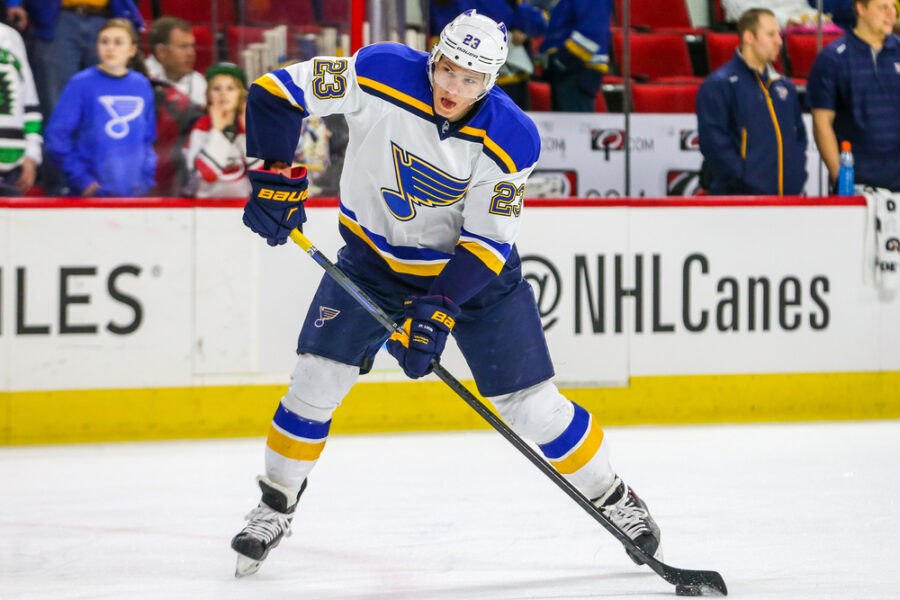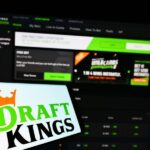St. Louis Blues sign up with DraftKings ahead of Missouri sports betting launch

The NHL’s St. Louis Blues have made DraftKings an official partner of the team.
The announcement comes ahead of Missouri’s December 1 legal sports betting launch and aligns with DraftKings’s league-wide NHL partnership that dates back to 2021.
According to the Blues, the agreement will include a focus on responsible gambling initiatives. Team officials said the partnership will feature a pregame, in-arena segment focused on safe gambling and support tools.
Those tools include activity trackers and budgeting features that DraftKings has designed to help users monitor and limit their gambling behavior.
Chief Revenue and Marketing Officer for the St. Louis Blues, Steve Chapman, said, “Providing Blues fans with the tools on how to play responsibly is a high priority for our organization as we all prepare for sports betting to launch in Missouri in December.”
As part of the deal, DraftKings will earn rights to use the St Louis Blues trademarks in marketing materials and will feature in-arena signage and ads on the team’s media channels.
Fan-focused events may also be part of the relationship, according to team officials, once the sports betting market is launched.
The partnership comes after DraftKings, along with sportsbook operator FanDuel, departed from the American Gaming Association due to their recent decisions to enter into prediction markets.
Abi Bray brings strong researching skills to the forefront of all of her writing, whether it’s the newest slots, industry trends or the ever changing legislation across the U.S, Asia and Australia, she maintains a keen eye for detail and a passion for reporting.
Verticals:
Sectors:
Topics:
Dig Deeper
The Backstory
Setting the table for Missouri’s launch
Missouri is sprinting toward a Dec. 1, 2025 launch of legal online sports betting, and a scramble for market position is reshaping partnerships between teams, casinos and sportsbooks. The state’s new regime features two “untethered” mobile licenses that allow operators to go live without a local casino or team partner—slots the Missouri Gaming Commission recently awarded to Circa Sports and DraftKings. The decision followed a constitutional amendment and a scoring process that weighed business expertise, integrity, sustainability, safety, advertising plans, revenue potential, responsible gaming commitments and the ability to grow bettor numbers. Despite concerns that Circa’s high-stakes model could yield less tax revenue than bigger rivals, regulators still greenlit its bid, underscoring a preference for competition and differentiated products. The outcome leaves other operators to enter via deals with casinos or pro teams, a dynamic already reshaping Missouri’s sports-business landscape. For detail on the licensing call, see the commission’s decision to grant untethered licenses to Circa Sports and DraftKings.
That framework helps explain why team-operator tie-ups are accelerating ahead of December. With only two standalone licenses available, the state’s five major pro teams and a dozen casinos have become pivotal gateways for the rest of the industry. The result is a fast-forming web of agreements that lock in market access, media inventory and fan engagement before the first legal bet is placed.
Teams as gatekeepers and kingmakers
Operators that missed out on an untethered license are locking in “tethered” routes to market. Early signals came when DraftKings and Underdog became the first to apply for Missouri licenses, highlighting the split paths to entry—either through a casino or a pro team, or via the scarce standalone permits. That path has since solidified into concrete alliances. FanDuel, which lost out on an untethered license, quickly announced a partnership with Major League Soccer club St. Louis City SC to secure market access, according to the licensing coverage. Baseball’s St. Louis Cardinals aligned with Bet365, and BetMGM tied up with Century Casinos, positioning both for tethered entry.
Casinos have become just as critical. Fanatics Sportsbook moved to secure a path by signing a multi-year licensing deal with Boyd Gaming, which operates the Ameristar-branded casinos in the state. Under the arrangement, Boyd will rebrand on-site sportsbooks to Fanatics, giving the digital retailer-turned-bookmaker a clear runway in Missouri’s retail and mobile channels. The deal is a notable shift for Boyd, which has typically partnered with FanDuel outside Nevada. For more on the casino side of these alliances, see Fanatics’ licensing partnership with Boyd Gaming.
Rivals crowd the Blues’ ice
The NHL’s St. Louis Blues are attracting multiple suitors as operators seek to convert fan affinity into sign-ups. Underdog, best known for daily fantasy sports, extended a multi-year deal with the team to deepen its in-arena presence and broadcast integrations. The company is expanding from fantasy into full-scale betting, with a licensed book in North Carolina and a pending Missouri application, and has partnered with the Kansas City Royals to secure a license in the state. The move gives Underdog a direct fan channel on both sides of Missouri’s pro sports divide. Details are in Underdog’s extended Blues partnership.
The Blues’ growing roster of partners mirrors the wider market’s urgency. With launch day approaching and only two untethered operators, brand visibility inside arenas and across team media channels is becoming the primary battleground for customer acquisition. That raises the stakes for everything from pregame activations to broadcast segments and co-branded content as sportsbooks look to convert early adopters and build loyalty. The competition also explains why operators that failed to secure a standalone license have quickly sought tethered deals with teams and casinos—and why teams, in turn, are leveraging their marketing assets to drive incremental revenue while adding guardrails around betting content.
Consumer risks and responsible play
The marketing arms race arrives as consumer groups warn of confusion and fraud risks. The Better Business Bureau cautioned that gambling-related scams in Missouri have surged, with its Scam Tracker complaints tied to online gambling doubling since 2023. The group flagged misleading terms and frozen accounts at unlicensed sites and urged consumers to verify that any sportsbook is licensed in the state and to read terms closely before depositing. The warning underscores the risk that a high-profile launch—and a flood of promotions—could blur lines between legal and illegal operators in the early months. Read more in the Better Business Bureau’s scam advisory.
Those concerns are shaping how teams and operators pitch their offerings. Responsible gambling language is moving front and center in in-arena segments and fan outreach, with tools such as activity trackers and budgeting features becoming standard. As operators expand their footprint through sponsorships and co-branded content, regulators and advocacy groups will watch how those safeguards are implemented across channels and whether advertising avoids targeting minors or vulnerable consumers.
What’s at stake by Dec. 1
Missouri’s structure is designed to balance competition with oversight, but early execution will set the tone. A handful of trends bear watching:
- Market concentration vs. differentiation: DraftKings enters as an untethered leader with national scale, while Circa brings a high-limit niche. Whether that variety expands the market or tilts share toward the biggest brands will shape revenue and tax performance. See the commission’s rationale in the untethered license awards.
- Team-driven acquisition: Partnerships with the Blues, the Cardinals and St. Louis City SC, among others, will test how much in-venue and broadcast inventory can convert to active bettors without oversaturating fans. The Underdog-Blues deal and Fanatics-Boyd pact preview that strategy.
- Compliance and consumer trust: The BBB’s warnings highlight the need for clear license disclosures and accessible self-limits. Operators that integrate robust guardrails may gain a reputational edge. The BBB alert outlines the risk landscape.
- Late-stage partnerships: With a Sept. 12 deadline for some tethered applications, expect more tie-ups across the state’s casinos and teams. Early filings by DraftKings and Underdog signaled the pace, and subsequent deals suggest a final rush before launch.
If Missouri mirrors other new markets, promotional intensity will spike at launch, followed by a shakeout as customer acquisition costs normalize and bettors consolidate around a handful of apps. The state’s blend of two untethered operators and a field of tethered entrants could deliver a competitive middle ground—so long as teams and casinos keep balancing aggressive marketing with responsible play. The next two months will show whether Missouri’s blueprint can scale without repeating the early pitfalls seen elsewhere in the U.S. betting rollout.







